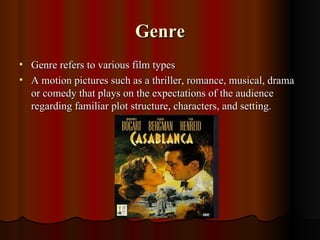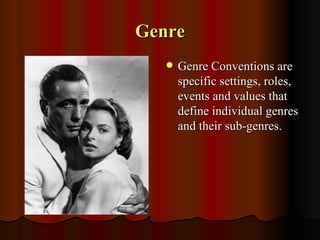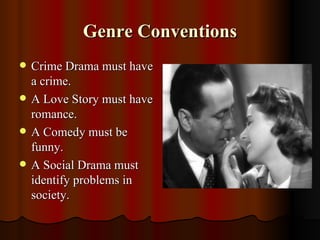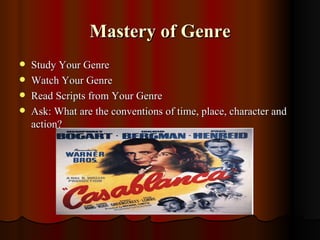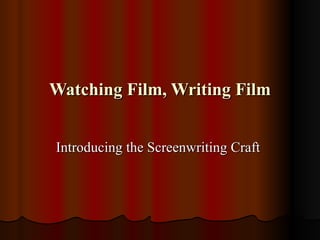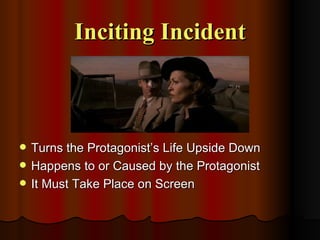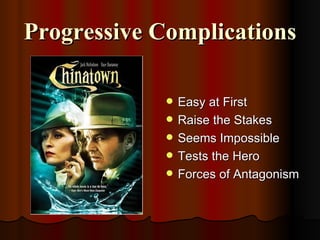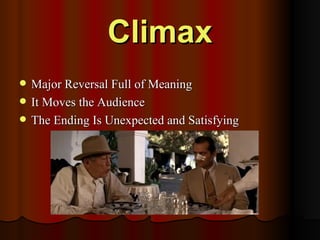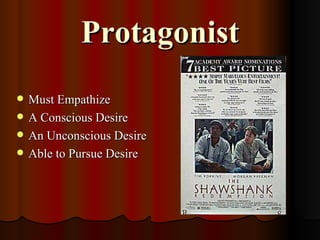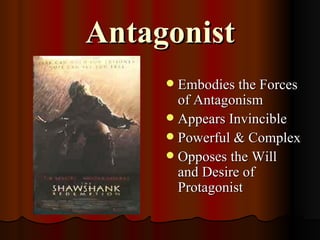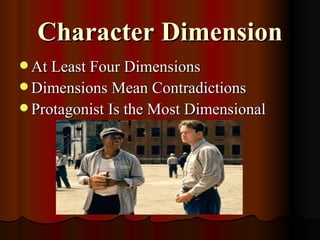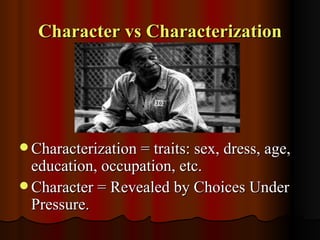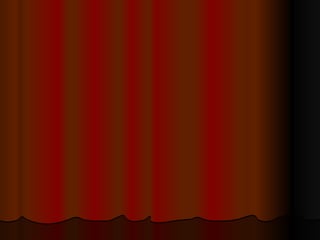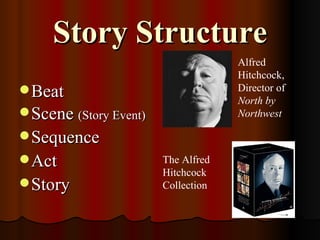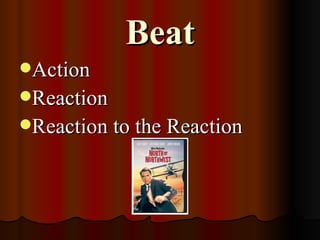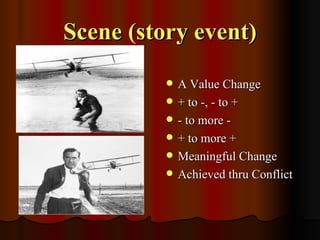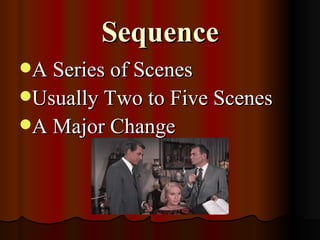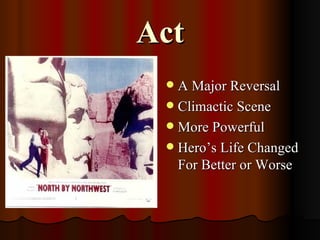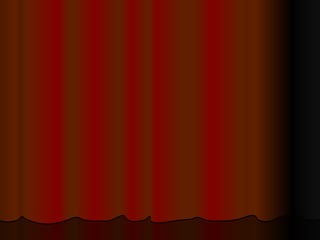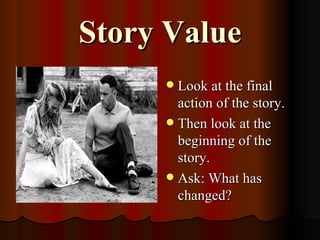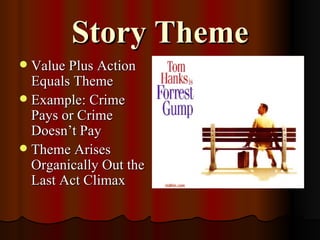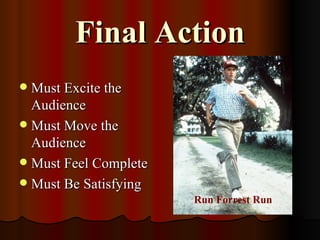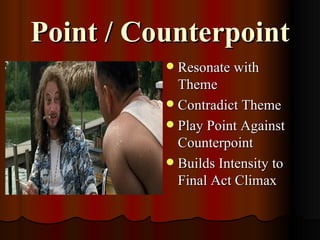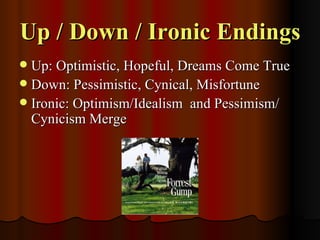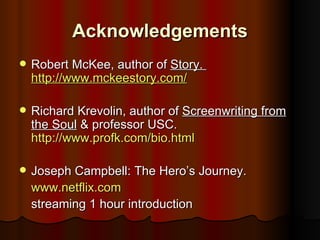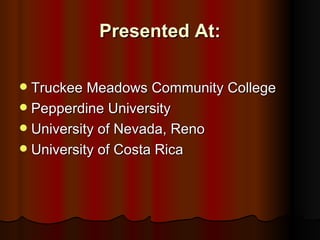Watching Film, Writing Film
- 1. Watching Film, Writing Film Introducing the Screenwriting Craft with Greg Nielsen
- 2. Genre • Genre refers to various film types • A motion pictures such as a thriller, romance, musical, drama or comedy that plays on the expectations of the audience regarding familiar plot structure, characters, and setting.
- 3. Genre Genre Conventions are specific settings, roles, events and values that define individual genres and their sub-genres.
- 4. Genre Conventions Crime Drama must have a crime. A Love Story must have romance. A Comedy must be funny. A Social Drama must identify problems in society.
- 5. Mastery of Genre Study Your Genre Watch Your Genre Read Scripts from Your Genre Ask: What are the conventions of time, place, character and action?
- 7. Watching Film, Writing Film Introducing the Screenwriting Craft
- 8. Plot Points The Inciting Incident Progressive Complications Crisis Climax Resolution Robert Towne, Screenwriter of Chinatown
- 9. Inciting Incident Turns the Protagonist’s Life Upside Down Happens to or Caused by the Protagonist It Must Take Place on Screen
- 10. Progressive Complications Easy at First Raise the Stakes Seems Impossible Tests the Hero Forces of Antagonism
- 11. Crisis All Seems Lost The Hero May Not Get What He Wants It Must Be on Screen The Hero Must Make a Decision (Dilemma) It’s the End of the Line Face to Face with the Forces of Antagonism
- 12. Climax Major Reversal Full of Meaning It Moves the Audience The Ending Is Unexpected and Satisfying
- 13. Resolution A Slow Curtain Resolve Subplots Satisfies Curiosity Courtesy Leave with Dignity
- 15. Watching Film, Writing Film Introducing the Screenwriting Craft
- 16. Characters Protagonist Antagonist Character Arc Character Dimension Character vs Characterization
- 17. Protagonist Must Empathize A Conscious Desire An Unconscious Desire Able to Pursue Desire
- 18. Antagonist Embodies the Forces of Antagonism Appears Invincible Powerful & Complex Opposes the Will and Desire of Protagonist
- 19. Character Arc Story by Stephen King Transformation Negative to Positive Positive to Negative Written and Change thru Choice Directed by Frank Darabont
- 20. Character Dimension At Least Four Dimensions Dimensions Mean Contradictions Protagonist Is the Most Dimensional
- 21. Character vs Characterization Characterization = traits: sex, dress, age, education, occupation, etc. Character = Revealed by Choices Under Pressure.
- 23. Watching Film, Writing Film Introducing the Screenwriting Craft
- 24. Story Structure Alfred Hitchcock, Beat Director of North by Scene (Story Event) Northwest Sequence Act The Alfred Hitchcock Story Collection
- 25. Beat Action Reaction Reaction to the Reaction
- 26. Scene (story event) A Value Change + to -, - to + - to more - + to more + Meaningful Change Achieved thru Conflict
- 27. Sequence A Series of Scenes Usually Two to Five Scenes A Major Change
- 28. Act A Major Reversal Climactic Scene More Powerful Hero’s Life Changed For Better or Worse
- 29. Story “A story is a series of acts that build to a last act climax or story climax which brings about absolute and irreversible change.” Robert McKee
- 31. Watching Film, Writing Film Introducing the Screenwriting Craft
- 32. Story Endings Value Theme Final Action Point / Counterpoint Up / Down / Ironic Endings
- 33. Story Value Look at the final action of the story. Then look at the beginning of the story. Ask: What has changed?
- 34. Story Theme Value Plus Action Equals Theme Example: Crime Pays or Crime Doesn’t Pay Theme Arises Organically Out the Last Act Climax
- 35. Final Action Must Excite the Audience Must Move the Audience Must Feel Complete Must Be Satisfying Run ForrestRun Run Forrest Run
- 36. Point / Counterpoint Resonate with Theme Contradict Theme Play Point Against Counterpoint Builds Intensity to Final Act Climax
- 37. Up / Down / Ironic Endings Up: Optimistic, Hopeful, Dreams Come True Down: Pessimistic, Cynical, Misfortune Ironic: Optimism/Idealism and Pessimism/ Cynicism Merge
- 38. Life is like a box of chocolate TheEnd
- 39. Acknowledgements Robert McKee, author of Story. http://www.mckeestory.com/ Richard Krevolin, author of Screenwriting from the Soul & professor USC. http://www.profk.com/bio.html Joseph Campbell: The Hero’s Journey. www.netflix.com streaming 1 hour introduction
- 40. Presented At: Truckee Meadows Community College Pepperdine University University of Nevada, Reno University of Costa Rica

